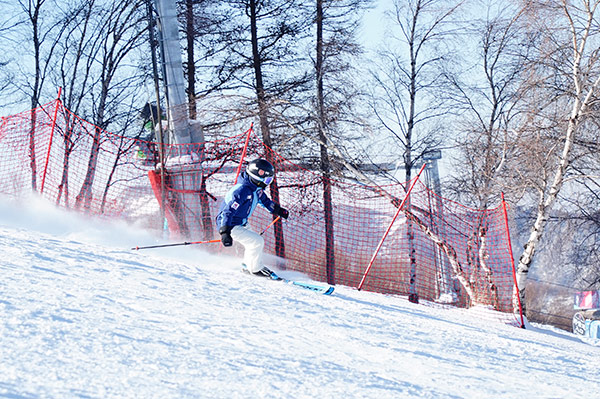

Doctor endures intense training to qualify for elite medical team at upcoming Winter Olympics, Wang Ru reports.
Skiing is a recreational activity that Fu Yan enjoys with her friends. Occasionally, they go for a leisurely ski and then have lunch together. She never imagined that she would one day be so involved in the sport.
When the Beijing Administration of Traditional Chinese Medicine was recruiting doctors in 2018 to offer medical care to athletes participating in the 2022 Beijing Winter Olympics, the doctor from Xiyuan Hospital of the China Academy of Chinese Medical Sciences signed up without hesitation.
"The recruitment is closely related to my profession, and I believe it would be great if I had the chance to use what I learned to do something for the Winter Games," says Fu who works at the emergency department of the hospital.
After more than three years of painstaking effort, the 38-year-old has become a qualified ski doctor ready for the Winter Games, and she says she is "confident" she will do her job well.
Back in 2018, Fu stood out among many other applicants with her proficiency in medical care, skiing and the English language. After several rounds of screening, she became a member of the team providing medical care to alpine skiers.
Alpine skiing is a sport with a high risk of injury, so ski doctors like Fu need to be ready to treat the injured. "If we are called to attend to the athlete on the slope, it means the athlete must have been badly injured," Fu says.
"We would be on duty at many medical sites. If we were informed of athletes falling on the slope and needing medical care, we would ski to the athlete immediately, offer treatment, and help transfer the injured out of the competition slope."
In preparation for the job, Fu had to improve her skiing capabilities. Although she could ski on the advanced slopes as a skiing enthusiast, she realized there was a wide gap between her recreational skiing and that required of a qualified ski doctor.
"I remember when I first skied under the guidance of a professional tutor, I felt like I was unable to ski. My previous way of skiing was problematic in the eyes of the tutor," Fu says.
When the Games begin, Fu and her colleagues need to ski on the steep icy slopes with medical equipment as heavy as 15 kilograms on their backs. "The International Ski Federation requires us to reach the injured in four minutes, so we need to hone our skiing techniques until we can ski easily as if we are walking and running on the slope," she says.